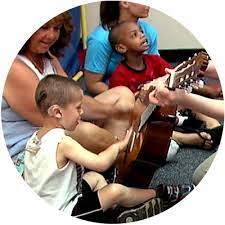
"Harmony Beyond Challenges: How Music Empowers Special Needs Children"
In the universal language of music lies a transformative power—one that transcends barriers, embraces diversity, and uplifts spirits. For children with special needs, music becomes a remarkable tool, offering a spectrum of therapeutic benefits and avenues for emotional expression, social connection, and cognitive development. Let's explore the profound impact of music on these exceptional children, unraveling how it serves as a catalyst for empowerment, growth, and joy.
Emotional Expression and Communication:
Non-Verbal Communication:
For children with limited verbal abilities, music provides a means of expression, allowing them to convey emotions, thoughts, and feelings through melodies and rhythms.
Emotional Regulation:
Music offers a safe space for emotional release, aiding in managing stress, anxiety, and fostering a sense of calm and emotional stability.
Cognitive Development:
Sensory Stimulation:
Engaging with music stimulates multiple senses, aiding sensory integration and cognitive processing, enhancing focus, attention, and spatial awareness.
Memory Enhancement:
Melodies and rhythms aid in memory retention, supporting learning processes and facilitating recall through repetitive patterns and musical structures.
Social Connection and Interaction:
Inclusive Environment:
Through music, children with special needs find an inclusive platform, fostering connections, friendships, and a sense of belonging within musical communities.
Collaborative Engagement:
Group music activities promote social interaction, turn-taking, and teamwork, encouraging cooperation and mutual support among peers.
Physical and Motor Skills:
Motor Coordination:
Playing instruments or engaging in rhythmic activities enhances motor skills, coordination, and fine motor control, aiding in physical development.
Sensory-Motor Integration:
Music-based movements and dances improve balance, coordination, and body awareness, supporting overall physical development.
Self-Expression and Confidence:
Creative Outlet:
Music offers a medium for self-expression, allowing children to explore their creativity, build confidence, and cultivate a positive self-image.
Sense of Achievement:
Mastering musical skills, learning songs, or performing in concerts instills a sense of accomplishment, boosting self-esteem and motivation.
Conclusion: Empowering Melodies, Boundless Potential
Music, as a catalyst for empowerment and growth, offers a transformative journey for children with special needs. It fosters emotional resilience, stimulates cognitive faculties, nurtures social bonds, and celebrates the unique abilities and potential within each child.
As these exceptional children engage with melodies, instruments, and harmonies, they transcend limitations, find their voices, and illuminate the world with the beauty of their unique musical journeys—a testament to the profound impact of music in unlocking the boundless potential within every child.
For children with special needs, music isn't just a melody; it's a catalyst for growth, emotional expression, and social connection, empowering them to navigate the world with confidence, joy, and a sense of belonging.
ABOUT AUTHOR : Musicintuit Admin
EXPLORE OUR ARRAY OF ONLINE MUSIC COURSES: Musicintuit Courses
ENROLL TODAY ! EXPLORE AND IMMERSE YOURSELF IN THE REALM OF MUSIC: Contact Musicintuit




